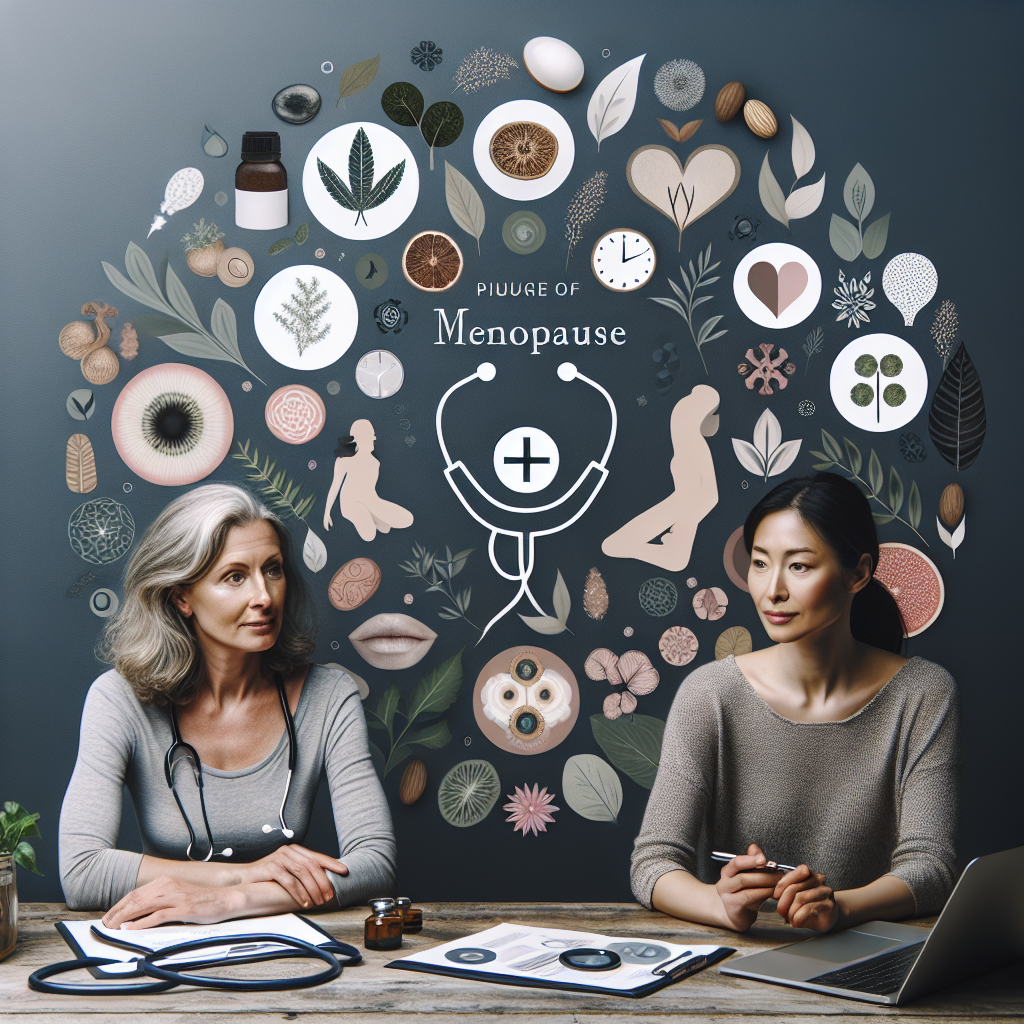
Navigating Menopause: A Wild Ride
Navigating menopause can feel like a wild ride, complete with hot flashes and mood swings, not to mention the shadow of depression.
Explore Homeopathy
Explore the gentle, holistic approach of homeopathy—where remedies are tailored just for you!
Discover Popular Remedies
Discover popular remedies, real women's experiences, and how to integrate this with conventional care for a balanced journey.
Finding Balance: Exploring Homeopathy for Depression in Menopause
Ladies, let's talk about that rollercoaster ride called menopause! Between the hot flashes that make you want to live in your freezer and the mood swings that have your family walking on eggshells, it's quite the adventure, isn't it? And for many of us, depression can be an unwelcome passenger on this journey. If you've been considering alternative approaches to managing these emotional challenges, you might be curious about homeopathy for depression in menopause. Let's dive into this gentle, natural approach with an open mind and a dash of humor!
When Hormones Go Haywire: Understanding Menopausal Depression
Before we explore homeopathy for depression in menopause, let's acknowledge what's happening in our bodies. Menopause isn't just about saying goodbye to your monthly visitor—it's a comprehensive renovation of your hormonal household!
During this transition, estrogen and progesterone levels perform their own disappearing act, affecting not just physical symptoms but also our brain chemistry. These hormonal shifts can influence serotonin and dopamine—those delightful neurotransmitters responsible for our happiness and well-being. No wonder approximately 20% of women experience depression during menopause, according to research published in the Journal of Women's Health.
As one menopausal warrior put it: "I went from feeling like myself to wondering who this weepy, anxious woman in the mirror was—all while sweating through my favorite pajamas!"
Homeopathy 101: What's All the Fuss About?
Homeopathy is like that quirky friend who does things differently but sometimes surprises you with their wisdom. Developed in the late 18th century by German physician Samuel Hahnemann, homeopathy operates on the principle of "like cures like"—the idea that substances that cause symptoms in healthy people can, in tiny doses, treat those same symptoms in sick people.
When it comes to homeopathy for depression in menopause, practitioners take a holistic approach, considering your unique emotional and physical symptoms rather than offering a one-size-fits-all solution. It's like getting a bespoke emotional support plan rather than an off-the-rack remedy!
Popular Homeopathic Remedies for Menopausal Depression
If you're exploring homeopathy for depression in menopause, you might encounter these commonly recommended remedies. Remember, homeopathic treatments are highly individualized, so what works for your book club buddy might not be your perfect match.
Sepia: For When You Just Can't Even
Feeling irritable, indifferent, and like you want everyone to just leave you alone? Sepia might be suggested for women experiencing depression with irritability and emotional detachment. It's particularly associated with feeling better after vigorous exercise—so if your mood improves after that Zumba class, take note!
Pulsatilla: For the Weepy Days
If your menopausal depression comes with tearfulness, a need for comfort, and changing moods that shift as quickly as spring weather, Pulsatilla might be recommended. Women who respond well to this remedy often feel better with consolation and company—the opposite of our Sepia sisters!
Lachesis: For Hot Flash Havoc
When your depression coincides with intense hot flashes, sleep disturbances, and a feeling of being worse after waking, Lachesis might be suggested. This remedy is often recommended for women who feel constricted by tight clothing (especially around the neck) and experience left-sided symptoms.
Natrum Muriaticum: For the Silent Sufferers
If you're keeping your depression private, preferring to cry alone and finding that consolation actually makes you feel worse, this remedy might be considered. Women who might benefit from Natrum Muriaticum often crave salt, feel worse from sun exposure, and have a deep sense of grief or loss.
The Science Behind Homeopathy for Depression in Menopause: What Do We Know?
Let's get real for a moment. When it comes to homeopathy for depression in menopause, the scientific community is still raising eyebrows. The National Center for Complementary and Integrative Health notes that there's limited scientific evidence supporting homeopathy's effectiveness for any health condition.
However, some studies offer interesting perspectives. A 2018 review published in the Journal of Alternative and Complementary Medicine found that certain homeopathic treatments showed promise for emotional symptoms during menopause, though researchers emphasized the need for more rigorous studies.
What might be at work here? Some researchers suggest that the benefits some women experience might be related to:
- The placebo effect (which isn't just "all in your head"—it can trigger real neurobiological responses)
- The thorough consultation process typical of homeopathic treatment
- The empowerment that comes from taking an active role in your health
As Dr. Jane Lyttleton, a women's health researcher, puts it: "While we need more research on homeopathy for depression in menopause, we shouldn't dismiss the experiences of women who report improvements. Their lived experiences matter in this conversation."
Integrating Homeopathy with Conventional Approaches
If you're considering homeopathy for depression in menopause, you don't necessarily need to choose between alternative and conventional medicine. Many women find value in an integrative approach.
Finding Your Support Team
Consider building a healthcare team that includes:
- Your primary care physician or gynecologist
- A mental health professional
- A qualified homeopathic practitioner with experience in women's health
This collaborative approach ensures you're addressing your menopausal depression from multiple angles. Remember to keep all practitioners informed about your full treatment plan to avoid any potential interactions.
Lifestyle Foundations for Menopausal Mood Support
Whether you're exploring homeopathy for depression in menopause or other approaches, don't underestimate these foundational elements:
- Movement Magic: Regular exercise has been shown to reduce depression symptoms and improve mood. Find something you enjoy—whether it's dancing in your kitchen or gentle yoga.
- Nourish to Flourish: Focus on omega-3 rich foods, complex carbohydrates, and plenty of fruits and vegetables. Some women find that reducing alcohol, caffeine, and sugar helps stabilize mood.
- Sleep Sanctuary: Create bedtime rituals that help you get quality rest, even when hormones are making it challenging.
- Stress Soothers: Explore stress-reduction techniques like mindfulness, meditation, or even simple deep breathing exercises.
- Connection Collection: Maintain social connections and consider joining a menopause support group where you can share experiences with women who truly get it.
Starting Your Homeopathic Journey: Practical Tips
If you're intrigued by homeopathy for depression in menopause and want to give it a try, here's how to begin:
Finding a Qualified Practitioner
Look for a homeopath with:
- Proper certification and training
- Experience with women's health and menopause
- A willingness to work alongside your conventional healthcare providers
- Good communication skills and a thorough consultation process
The National Center for Homeopathy can help you locate qualified practitioners in your area.
What to Expect in a Consultation
Unlike a quick conventional doctor's visit, your first homeopathic consultation might take 1-2 hours. The practitioner will ask detailed questions about:
- Your physical and emotional symptoms
- Your sleep patterns
- Your food preferences and aversions
- Your reaction to different weather conditions
- Your personal and family medical history
This comprehensive approach helps them identify the specific remedy that matches your unique symptom picture.
Questions to Ask Before Starting
Before beginning homeopathy for depression in menopause, consider asking:
- What results can I realistically expect?
- How long should I try this approach before evaluating its effectiveness?
- Are there any potential interactions with my current medications?
- What changes should I report to you?
- What's your approach if I don't see improvements?
Real Women, Real Experiences with Homeopathy for Depression in Menopause
While scientific studies provide one type of evidence, women's lived experiences offer another valuable perspective on homeopathy for depression in menopause.
Maria, 53, shares: "After trying Sepia for my menopausal depression, I noticed gradual improvements in my mood over about three weeks. I'm not saying it's a miracle cure, but combined with regular walks and my support group, I feel more like myself again."
Meanwhile, Jennifer, 55, offers a different experience: "Homeopathy didn't make a noticeable difference for my depression symptoms, but the process of working with a practitioner who really listened to me was valuable. I eventually found relief through a combination of therapy and low-dose antidepressants."
These diverse experiences remind us that there's no one-size-fits-all solution for menopausal depression. Your journey is uniquely yours.
The Bottom Line: Is Homeopathy for Depression in Menopause Right for You?
As we wrap up our exploration of homeopathy for depression in menopause, here's what to keep in mind:
- Consider the evidence: While some women report benefits, scientific support for homeopathy remains limited.
- Weigh the risks: Homeopathic remedies themselves typically have few side effects due to their high dilution, but relying solely on homeopathy while delaying proven treatments for severe depression could be risky.
- Reflect on your values: Your personal health philosophy and what feels right for your body should guide your choices.
- Keep communication open: Whatever you decide, keep your healthcare providers informed about all approaches you're using.
Remember that menopause, with all its challenges, is also a powerful transition—a time when many women rediscover themselves and their priorities. Whether homeopathy becomes part of your toolkit or not, approaching this journey with self-compassion, curiosity, and even a sense of humor can make all the difference.
After all, we're in this together, navigating the sometimes choppy waters of hormonal change with wisdom, resilience, and hopefully, a few good laughs along the way. Because if we can't laugh about waking up in sweat-soaked sheets only to be freezing cold five minutes later, what can we laugh about?
Here's to finding your balance, whether through homeopathy for depression in menopause or whatever combination of approaches works for your unique self!
















